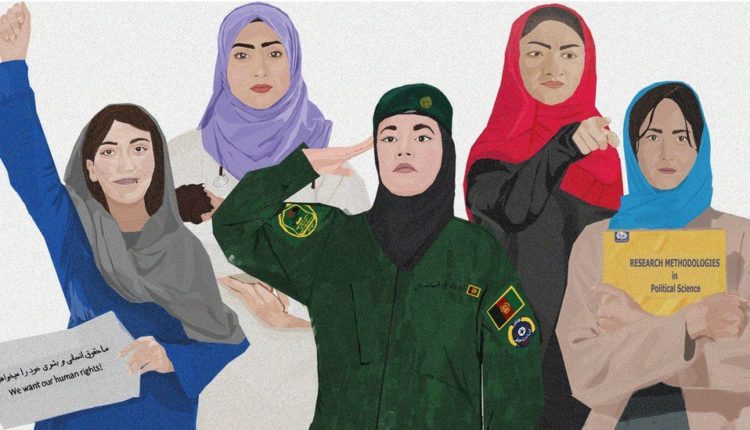When the Taliban swept into Kabul on 15 August the only shots they fired were in celebration. For Afghan women, the salvos represented the loss of all their rights and freedoms. Five of them have been sending the BBC daily diaries, which provide a portrait of their rapidly changing lives.
15 August – ‘Day of Judgement’
There’s a scene in The Handmaid’s Tale, the TV series based on Margaret Attwood’s dystopian novel, where the main character, book editor June Osborne, arrives at her office one morning only to learn that the country’s new leaders have banned women from the workplace.
Her boss gathers all the female staff and tells them to pack up their belongings and go home.
On 15 August 2021, Maari, a former soldier in the Afghan Army, has an almost identical experience. At 07:30, she leaves for work in a government ministry, expecting a busy day of meetings and conferences. Stepping outside, she immediately notices that the streets are eerily quiet, but she continues on her way, getting out her phone to check her calendar for meetings.
“You’ve come to work!” say astonished male colleagues when she walks in.
“I don’t think Kabul is going to fall,” she replies.
But she has barely put down her bag when her boss confronts her. “Go and tell all the women to go home,” he says. She does as she’s told, going from room to room telling female employees to leave right away. But when her boss asks her to go home, she refuses.
“As long as my male colleagues are staying and working, I am too,” she says.
Maari’s not just any member of staff. She’s a high-ranking official with an impressive military record, and her boss reluctantly accepts what she says.
But as the day goes by, reports of the Taliban entering Kabul become impossible to ignore. Maari’s boss decides to shut the ministry’s doors and send everyone home.
Elsewhere in the city, Khatera, a geography teacher, is starting a new lesson – her 40 students, all teenage boys, flick through their books to find the right page.
Before long, other teachers enter the classroom, holding their phones. There are conflicting reports on Facebook: some say the Taliban are in Qargha, a town on the outskirts of Kabul, some that they’re in Koht-e Sangi, already inside the city. The headteacher soon stops lessons and sends everyone home.
When Khatera reaches the bus stop, she sees people running in every direction, carrying luggage and children. Traffic is at a standstill.
“Everyone is sargardaan,” she writes – the Dari word for “lost”. “It’s like the Day of Judgement here.”
Khatera starts walking. To begin with she’s not worried, but then she notices Afghan soldiers heading for the airport with their bags on their backs, their children walking behind, holding the ends of their mothers’ scarves. Everyone is leaving.
Khatera’s heart races and she starts jogging. Now she knows the Taliban are back.
“It’s the worst nightmare,” she keeps repeating under her breath.
At roughly the same time, Zala, a student at the American University of Afghanistan, receives an email saying she’ll be evacuated to the US within 48 hours.
She makes a quick journey to Shar-e Naw, an area of north-west Kabul that’s good for shopping, to buy last-minute travel essentials.
She too suddenly sees people running and asks what’s going on. The first person she stops is in too much of a hurry to answer, then a man tells her the Taliban have taken Kabul.
Zala goes numb.
“I’m losing all my strength, my hands and feet start shaking. How will I make it home?” she thinks to herself. She cries as she passes cafes and restaurants where she regularly caught up with friends, drank coffee and listened to music. Her whole life flashes in front of her.
She’s too young to have known Taliban rule but she has heard horror stories from her parents who lived under their regime in the 1990s. Unless she gets on the flight, this will be her future. BBC


Comments are closed.